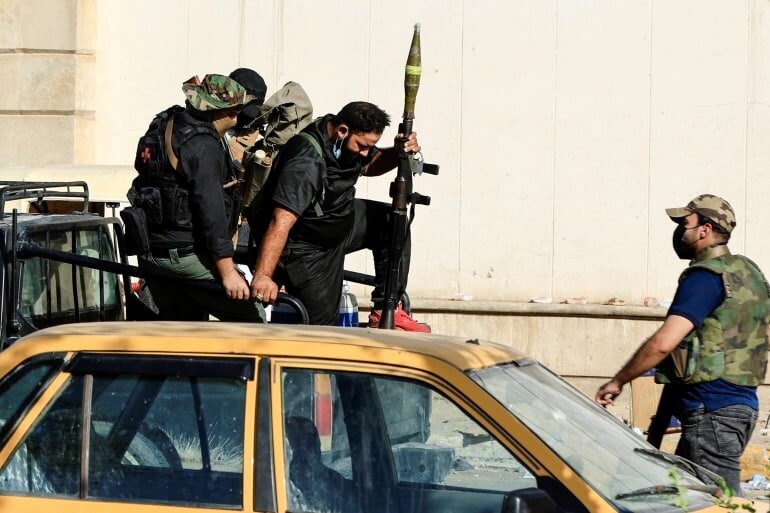Iraq: Violence is not a solution

TEHRAN – After 24 hours of intense infighting, law and order were restored in Iraq amid a highly charged atmosphere, but the situation remains fragile and prone to another round of violence.
Protesters and militants affiliated with the Sadrist movement began their quick withdrawal on Tuesday at noon immediately after their leader, Muqtada Sadr, called on them to evacuate the heavily fortified Green Zone of Baghdad, which have witnessed intense infighting between the Sadrists and their Shiite rivals.
“What is happening in Iraq saddened me a lot,” Sadr said in a brief presser on Tuesday. “I apologize to the Iraqi people who are the only ones damaged by what’s happening.”
The nationalist cleric then ordered his followers to immediately withdraw from the Green Zone. “I still believe that the Movement is disciplined and obedient. So, if they don’t withdraw within 60 minutes from even the sit-in in front of the Parliament, I will disavow even the Movement,” Sadr said.
After this order, Sadrist protesters and militants immediately left their positions in the Green Zone, a move that was widely welcomed by politicians of all hues.
Muqtada’s order put an end to 24 hours of infighting, which daunted Iraqis from all walks of life and sparked dreadful fears of a return to the mid-2000s sectarian clashes.
As of Tuesday noon, Baghdad and other protest-stricken provinces got back to normal life, but the situation remains fragile and, without a political settlement, could quickly deteriorate again.
That explains why many Iraqi politicians and regional countries are pushing for a dialogue to settle the differences.
“His Eminence Muqtada Al-Sadr’s call to stop violence is the epitome of patriotism and respect to the sanctity of Iraqi blood. His speech emplaces national and moral duty upon all to protect Iraq and stop political escalation and violence and, to immediately engage in dialogue,” Iraqi Prime Minister Mustafa al-Kadhimi said on Twitter.
Iran also underlined the need for Iraqis to engage in a dialogue. The clashes in Iraq erupted while the country’s foreign minister, Fuad Hussein, was in Tehran for talks with Iran over a range of issues. He met with Iranian counterpart Hossein Amir Abdollahian and Iranian President Ayatollah Seyed Ebrahim Raisi.
In his meeting with Hussein, Ayatollah Raisi said that security and stability in Iraq can only be established through dialogue between all the political currents of the country, based on the constitution and in order to reach an understanding on the formation of a new government to solve the problems of the Iraqi nation.
He stressed, “The religious authorities play a very important role in this regard,” according to the Iranian presidency.
President Raisi also appreciated the Iraqi government's consultations on regional affairs and added, “Iraq's initiatives and measures to improve the atmosphere of cooperation among regional countries without the interference of outsiders will be effective in strengthening regional integration.”
Amir Abdollahian also underlined the need to resolve Iraq’s internal issues through peaceful ways. The Iranian foreign minister said it is important that Iraq’s stability, calm and national unity are protected and its legal institutions are respected, and reiterated the Islamic Republic of Iran’s stance that existing issues in Iraq’s internal scene are resolved within the framework of legal processes, while maintaining the power of the government of Iraq.
Also, last week, Ayatollah Raisi spoke with the Iraqi prime minister and called for dialogue. Underlining the need to maintain unity in Iraq, Iranian President Ebrahim Raisi said, “All the main political currents of Iraq should agree on a way out of the existing political problems through interactive dialogue.”
Iraq has been racked by a political commotion since the October 2021 parliamentary election which handed the Sadrist movement a clear, yet inconclusive, victory.
A few weeks ago, the Sadrists began an open-ended sit-in at the Iraqi parliament and on Tuesday they expanded it to include the Iraqi judiciary, a move that prompted al-Kadhimi to cut his visit to Egypt and return to Baghdad to follow the developments.
“PM @MAKadhimi warned that disrupting the work of the judicial institution exposes the country to real dangers, stressing that the right to protest is constitutionally guaranteed but with the need to respect state institutions. PM @MAKadhimi called for calm, and for an immediate meeting of the leaders of political forces in order to activate the national dialogue and defuse the crisis,” the Iraqi government said in a statement on Twitter.
